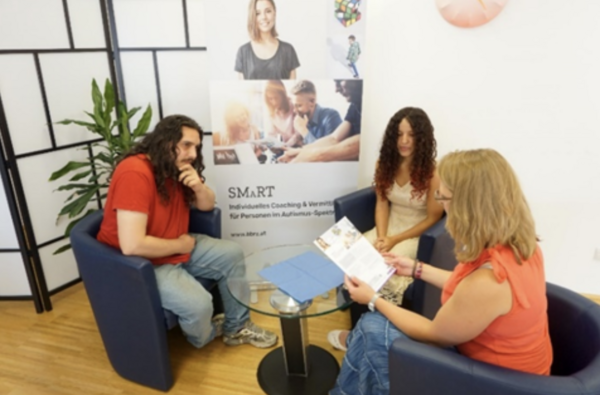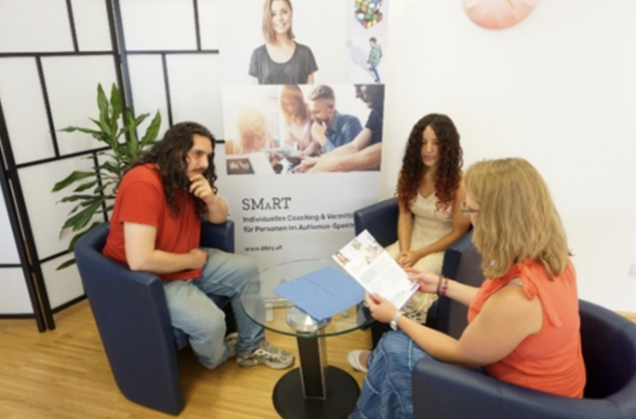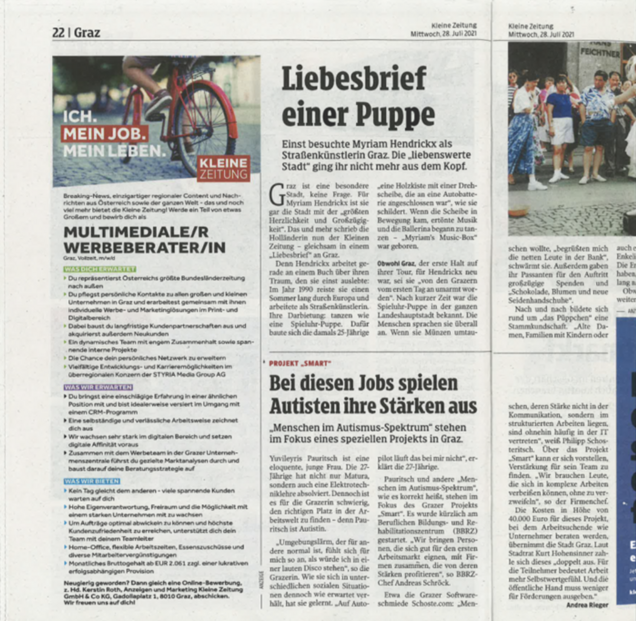FOKUS and SMaRT: Two services for persons on the autism spectrum

Name of practice: FOKUS and SMaRT
Organisation: BBRZ - Vocational Education and Rehabilitation Center
Description of the Organisation: BBRZ has been providing services for people with various disabilities since 1976. The services aim to (re)enable people with disabilities to actively participate in professional life (and thus in social life). All measures are temporary and thus have a clear focus on preparing people for the world of work and empowering them to take the further steps as independently as possible.
Country: Graz, Austria
Year of initiation: 2020 (FOKUS), 2021 (SMaRT)
Funding: FOKUS – Developed and financed in close cooperation with the Styrian Social Ministry Service. SMaRT – Financed by the city of Graz
Link to UNCRPD: Article 27 – Work and employment
Description of Practice: To support the transition of persons with disabilities back into the labour market, BBRZ has developed two unique services offered to persons on the autism spectrum. FOKUS (a maximum 26-weeks programme) aims to strengthen the work-oriented and social skills of people on the autism spectrum, helping them to develop a focused career perspective. The clients spend approximately 25 hours per week in primarily group settings but also in individual coaching sessions, looking at how to improve social skills and effectively handle their emotions within the work context.
Parallel to this, SMART is a 6-month programme which addresses persons who already possess a strong career perspective, job-relevant knowledge, and the necessary social skills. Sessions instead revolve around free counselling for companies on the topic of employment and the autism spectrum, as well as individual coaching and placement for the affected people.
Problem Targeted: It is estimated that approximately 80% of persons with high-functioning autism are unemployed. Few services exist that are tailored to the needs of persons on the autism spectrum, particularly ones focused on how to gain and/or maintain employment. This target group was usually co-managed in services for people with psychiatric diagnoses, often without appropriately trained staff and with little opportunity to address their needs.
Solution provided: BBRZ’s established projects aim to provide peer-learning sessions as well as individual and group coaching specifically tailored to the target group. Sessions are managed by autism-specific trained professionals and focus on social skills for the work context as well as obtaining and securing a job. The practice has pursued a holistic and increasingly individual, tailor-made and competence-seeking/resource-oriented approach, involving close cooperation with companies on the labour market.
These companies provide valuable information about what is required of workers as part of different professions and help identify niches for persons on the autistic spectrum. BBRZ can then work with the beneficiaries to find jobs willing to train them and that match their skillset. Additionally, clients can participate further in neurofeedback, health and creative workshops and occupational therapy.
Impact generated by the practice: The servicespromote social skills and improve integration in group dynamics. As a result, clients feel empowered and better equipped to face the labour market. Persons on the autism spectrum who are well-integrated in a company can provide valuable perspectives and thereby encourage a more diverse mindset in the workplace.
BBRZ has already recorded positive placement figures in these existing practice (depending on the measures, the labour market integration figures have been around 50-80% for years). This is also possible because companies that were once satisfied with the recruitment of a BBRZ participant, are much more open to new partnerships.
Sustainability of practice: The sustainability of the practices is demonstrated by an increasing demand and interest from various funding bodies to collaborate with BBRZ, ensuring further high-quality support for the target group.
Contact Information:
Ingrid Pammer, Coordinator of International Activities
Additional links:
Information on the services (German):
- Für Menschen im Autismus-Spektrum / BBRZ - Berufliches Bildungs- und Rehabilitationszentrum
- Produktblatt BerufsDiagnostik Austria Graz (bbrz.at)
- SMART: Kostenlose Beratung für Unternehmen rund ums Thema Beschäftigung und Autismus-Spektrum (bbrz.at)



Two affected clients from the current project spoke openly about their difficulties in the job application process due to their autism and about the advantages of the current support services for people with autism at the BBRZ. One of them already has got a job in the meantime.
The article emphasises the importance of companies being willing to give people with autism a real chance in the first labour market.

